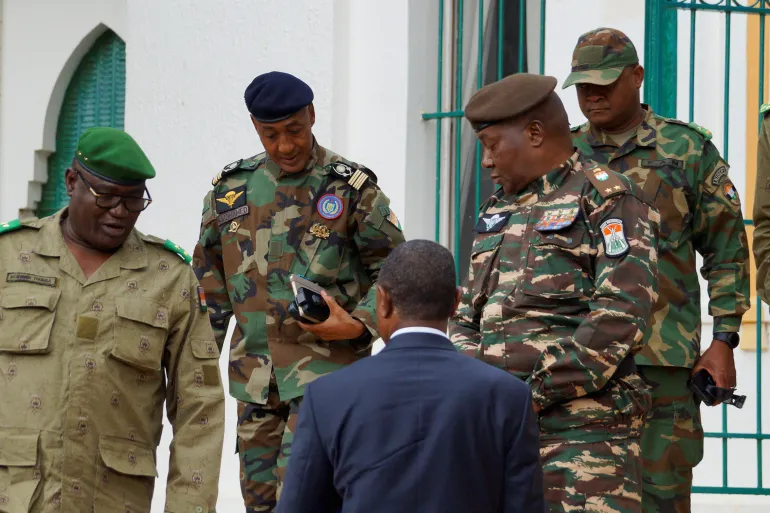Niger Republic coup: Never say never!
Once again, the military in Africa are generating headlines, and the publicity is not about victories over foreign enemies on the battlefield, rather it’s about seizing political power. In the Republic of Niger, the military has taken over, and viral videos show citizens stoning politicians who were attempting to escape with their ill-gotten assets and […]

Once again, the military in Africa are generating headlines, and the publicity is not about victories over foreign enemies on the battlefield, rather it’s about seizing political power.
In the Republic of Niger, the military has taken over, and viral videos show citizens stoning politicians who were attempting to escape with their ill-gotten assets and singing praises in support of the military. Citizens’ resentment towards politicians is overwhelming and evident.
All political analysts had said that military coups would “never” happen again in West Africa because military officers pledge loyalty to civilian governments and always assert that they will never do something which they are capable of doing. It is better they limit what they confidently say they will never do, only to what they cannot and will never be able to do.
Indeed, people should never say “never again” or “not yet” or even “never” because nobody knows what they will do in a situation until faced with it. Ironically anybody who says “I never say never” just did it twice! American actor Mike Coulter said “Never say never about anything in life, because if you do, then life has a way of humbling you”; while the 30th US President Calvin Coolidge said ironically, “The things I never say, never get me into trouble!”
Nigeria’s economic policy of subsidising poverty
The coup d’état surge after years of relative calm
Although West African leaders have condemned the coup which was supposed to never happen again, there is little if anything they can do about it. What should be worrisome for them is the widespread support the coup is getting from ordinary citizens.
If the president of Niger had been doing well, citizens would not be rejoicing. Instead of learning the lessons, leaders of the Economic Community of West African States (ECOWAS) are busy holding meetings and chasing shadows. They would be well advised that rather than flexing muscles overseas and asking foreign citizens to continue bearing deprivations, they must forestall coups in their own countries by conceptualising their own people-oriented development programmes that will make life more bearable for their citizens.
Former Kaduna Senator Shehu Sani correctly tweeted that there are five factors responsible for the rise of military coups and the collapse of democratic governments in West Africa. These are, the strangulation of democracy by the political class; economic challenges that lead to widespread hunger; security challenges and the spread of terror; expanding Russian and Chinese influence in the economic and political spheres; and lastly the failure of sanctions to have any meaningful impact on successful coup plotters.
To be sure good political leadership is the ability to motivate and influence people to move in a certain direction through inspiration and self-sacrifice, not through intimidation.
Unfortunately, African political leaders believe that they are entitled to a life of luxury and affluence irrespective of the level of poverty in their nation. Almost all West African nations are in a situation similar to that of Niger where the pillars of democracy which include the protection of the fundamental rights of citizens, an impartial unblemished judiciary, an independent free press, credible elections and the rule of law have fallen and citizens live in helplessness and virtual poverty.
Questions are seriously being asked as to why bother with democracy which has in no way benefitted the populace and has indeed become so detestable? African rulers elected under sub-standard democratic processes tend to hold their citizens in utter disdain and contempt resulting in very few Africans having ever experienced what it means to live in a decently run society. Their only experience is of inept, insensitive, corrupt leadership.
Those holding political office must be wary that citizens will not endlessly allow themselves to be deluded by ethically bankrupt politicians, so military coups however ill-motivated will always garner public support.
When, as is currently the case in Nigeria, citizens want to assert their rights and strike to protest against increasing hardships due to poorly introduced economic austerity measures, the very idea of using the courts to prevent strikes is a recipe for trouble. No court should ever rule that workers must become slaves and work to death because of ill-considered economic measures of government.
In elections which are generally not credible, Africans generally vote according to primordial sentiments that empower their sworn enemies to continue their perpetual impoverishment and devalue their lives. In a democracy, government is supposed to be afraid of the electorate, not the other way around, as is currently the case.
Democratically elected governments in Africa have a reputation for operating unconstitutionally, being unfeeling and lacking sympathy for the plight of citizens. Regrettably, national assemblies serially overlook constitutional breaches and constitutional restraints on wielding power, simply to curry favour with the executive who controls the purse strings, irrespective of the ill effects on the general populace.
Right-thinking governments build scenarios for the consequences and negative impacts of policies, and plan how to cushion the effects.
In Nigeria, the new administration rushed to implement a policy and is now scrambling unsuccessfully to address the devastating aftereffects! When policies that have not been meticulously thought through are hastily implemented and there is a backlash or resistance, more mistakes are likely to be made in the rush to put things back in order.
If more care and compassion are not exhibited by governments in West Africa, then there is likelihood of more coups in the future. Politicians should not believe that citizens will not rejoice if it ever happens again!
